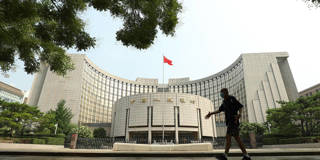 Jiang Qiming/China News Service via Getty Images
Jiang Qiming/China News Service via Getty Images
中国特色的量化宽松?
香港—2020年,美国外交关系委员会的塞巴斯蒂安·马拉比(Sebastian Mallaby)宣布,发达经济体将“重新定义其货币和财政能力的外部界限”,进入“神奇货币时代”。到2022年7月,马拉比预言这个时代即将结束。但是,尽管大多数主要央行现在都在逆转量化宽松(QE)并提高利率,但中国可能需要朝着相反的方向前进。
观察人士经常忽略,量化宽松是日本央行在2001年发明的,当时它是用来应对资产负债表通缩的工具。其他工具包括零利率和前瞻性政策指引。日本央行的资产负债表从2001年占GDP的20%扩大到2006年的30%,主要得益于购买日本政府债券。
然而,正如野村证券(Nomura)经济学家辜朝明(Richard Koo)在2010年观察到的那样,宽松的货币和财政政策并没有刺激企业和家庭投资或支出,因为他们仍然专注于修复自己受损的资产负债表。因此,在2015年,日本央行行长黑田东彦(Haruhiko Kuroda)推出了所谓的量化和质化宽松(QQE)。
https://prosyn.org/ytfHB5Nzh
To continue reading, register now. It’s free!
Register Now
Already have an account?
Log in



香港—2020年,美国外交关系委员会的塞巴斯蒂安·马拉比(Sebastian Mallaby)宣布,发达经济体将“重新定义其货币和财政能力的外部界限”,进入“神奇货币时代”。到2022年7月,马拉比预言这个时代即将结束。但是,尽管大多数主要央行现在都在逆转量化宽松(QE)并提高利率,但中国可能需要朝着相反的方向前进。
观察人士经常忽略,量化宽松是日本央行在2001年发明的,当时它是用来应对资产负债表通缩的工具。其他工具包括零利率和前瞻性政策指引。日本央行的资产负债表从2001年占GDP的20%扩大到2006年的30%,主要得益于购买日本政府债券。
然而,正如野村证券(Nomura)经济学家辜朝明(Richard Koo)在2010年观察到的那样,宽松的货币和财政政策并没有刺激企业和家庭投资或支出,因为他们仍然专注于修复自己受损的资产负债表。因此,在2015年,日本央行行长黑田东彦(Haruhiko Kuroda)推出了所谓的量化和质化宽松(QQE)。